Trending
Opinion: How will Project 2025 impact game developers?
The Heritage Foundation's manifesto for the possible next administration could do great harm to many, including large portions of the game development community.
Partway through a replay of 2009’s Final Fantasy XIII, recently re-released for Windows PC, I’m starting to think that it's the most misrepresented and unfairly maligned game of the previous console generation.

You know there’s something funny going on when a game is this polarizing. A casual search of FFXIII-related videos on YouTube will unleash some of the most unrestrained, vitriolic cyberspew to be found (a scary prospect indeed). "It's too linear! Too feminine! Too story-centric! It's a disgrace to the Final Fantasy brand!" Criticisms often range, curiously, between opposite extremes: "It's too easy! It's too difficult! The story is good, but the characters suck! The characters are good, but the story sucks!"
Motomu Toriyama and crew set out to make a game that, unlike like prior Final Fantasy titles and the Assassin’s Creed series, presents a tightly-designed and narrative-driven experience where forward momentum is key rather than dazed exploratory wandering. Those who loved FFXII praised the depth of its sidequests, which, like those of the Elder Scrolls games, distracted a handful of spellbound reviewers for well beyond 100 hours. Minigames like Triple Triad, Blitzball, or chocobo racing were welcome distractions from the intensity of the main questline in classic Final Fantasy games. FFXIII, on the other hand, only does a few things, but it does them really well.
Take the combat for example: by eliminating micromanaging and focusing instead on “big picture” planning, battle designer Yuji Abe created a system that was simultaneously more thoughtful, more considerate of the player’s time, and simply more fun than prior systems. It’s faster than X-2, more strategic than X, and almost as seamless as XII.
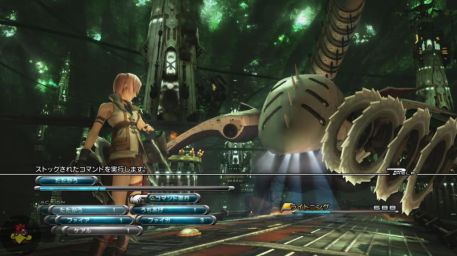
As for the story: say what you want, but the FF series has always been about far-fetched and sometimes unjustifiably high-minded sci-fi/fantasy. It’s neither the most interesting plot (it’s really just a retread of Xenogears), nor is it close to the worst the series has to offer. Where XIII really excels, however, is in pulling together a large and diverse cast of characters. Its greatest moments are found in their interactions and evolving relationships.
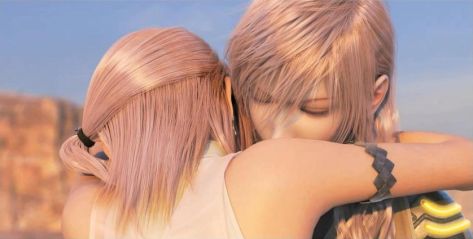
Lightning is cool. She is arguably the coolest character Tetsuya Nomura has ever designed. Fang, meanwhile, is possibly the strongest female character in the entire history of JRPGs. She’s self-motivated, funny, and interesting. Whereas major Hollywood blockbusters like the Avengers still manage to fail the very basic criteria of the Bechdel test, FFXIII, with its female-driven cast, exceeds them in almost every major scene.
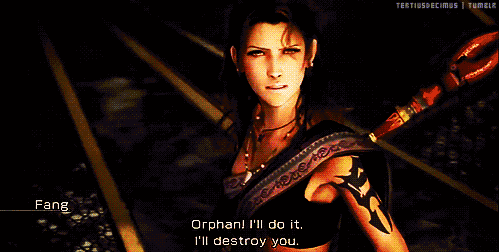
Critics call out Sazh as a black stereotype, but really that’s just because he’s a black man in a Japanese game, and if you can’t normalize that in your brain, that's on you. Like Barrett before him, the character Sazh intentionally defies stereotypes by exhibiting the values of intelligence, emotional complexity, and responsible parenting.
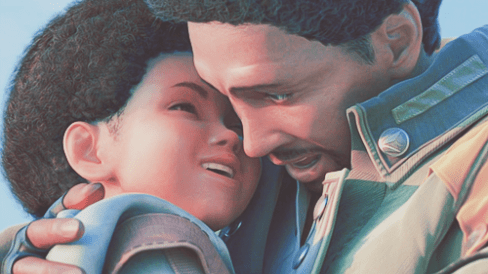
Individually, Vanille isn’t that interesting, but her close friendship with Fang is moving and forms the center of an evolving narrative that saddles them with the burden of saving a world that is not their own (at great personal risk). Snow and Serah are pretty weak, but luckily they don’t get a large share of the script. Hope is whiny and contemptible throughout the early chapters, but as he learns from Lightning to be strong and stand up for himself, he grows into a mature individual by the end.
Even throwaway characters have a sense of purpose and agency. It’s more than can be said for the lion’s share of games in this genre, which more often than not paint with such a wide brush that the overall picture is an unsightly mess.
Even one of the indignant reviewers who scored FFXIII a “0” on Metacritic would undoubtedly agree that it’s the best-looking Final Fantasy to date. One of the game’s first great setpieces is a lake “frozen” into crystal by a cataclysmic event with a Fal’Cie, the deities of its fictional world.
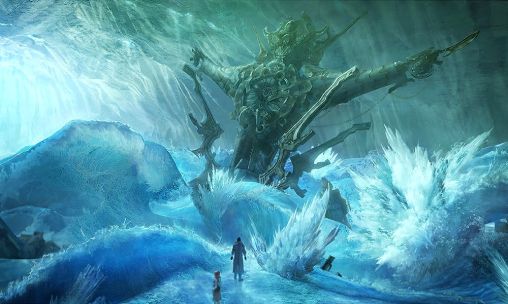
Although only narrowly explorable, the settings of this game are majestic and intricately detailed. The 3D artistry on display here is some of the best ever seen in any medium. The recent PC release of the game will undoubtedly produce some great imagery as crafty modders scale the rendering resolution up to Ultra-HD and beyond.
The beautiful sights are paired, moreover, with an excellent score by Masashi Hamauzu, an up-and-coming composer who has led the sound team for the entire XIII trilogy.
Hamauzu’s musical inspirations are quite different from veteran Nobuo Uematsu’s Progressive-Rock-by-way-of-Tchaikovsky. Uematsu had a gift for tapping into the emotional core of every scene the way great film composers do. The new sound, although not unwelcome, doesn’t have the same distinctiveness as the older soundtracks. With a sweeping orchestra at his fingertips, Hamauzu frequently lacks the intimacy of Uematsu’s best achievements, which are more suited to the chamber than the symphony hall.
It’s easy to fall into the trap of making comparisons, however. Just like Hamauzu and Uematsu, Motomu Toriyama and former series director Hironobu Sakaguchi had very different approaches with the series. Both wanted to tell a good story, but diverged sharply on how that ought to be accomplished in a videogame. Sakaguchi was informed by Dungeons and Dragons and Dragon Quest–both of which encourage exploration and a free-form approach to world building. Toriyama, on the other hand, looks to first-person shooters like Call of Duty and action-adventure games where forward momentum is key. Now that Toriyama’s tenure as series director has expired with the Lightning saga, veteran designer Tetsuya Nomura is introducing his own personal style to the franchise with Final Fantasy XV, which resembles his other series, Kingdom Hearts, in many ways, featuring context-sensitive mechanics and real-time action.
If nothing else, Final Fantasy XIII and its two sequels prove that Square Enix is still audacious enough to challenge themselves and implement new, untested ideas. That creative evolution is still the defining characteristic of their flagship series, and they will continue to funnel the best available talent and resources to keep it going. Back in 1987, Final Fantasy was the little RPG that could: it made no great impact at the time, but sold just enough to allow its designers to take a few risks with the next one. It was supposed to be final! It was only a trick of fate that allowed it to live on. In 2014–almost 30 years later–the story is still largely the same: Final Fantasy has never overtaken the success of its adopted sibling, Dragon Quest, but it still manages to soldier forward (no pun intended), constantly reexamining and reinventing, never resting on its laurels.
Read more about:
BlogsYou May Also Like